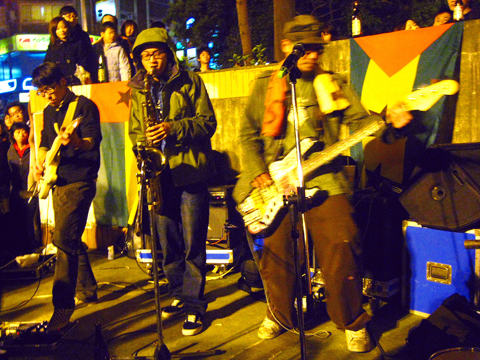Dub has been around since Osbourne “King Tubby” Ruddock and Lee “Scratch” Perry developed it in the late 1960s, but the sound is relatively new for Taiwan.
Taimaica Soundsystem — its name is a combination of Taiwan and Jamaica — wants to establish this Jamaican reggae/dub sound here. The band’s music is an organic hybrid of live sound with electronic manipulation. Membership has grown from three musicians to nine over the last couple of years.
“We like dub music and lots of other music genres — that’s why we have nine members,” Taimaica member Dahu Hu said in an interview on Tuesday. “We all have different music backgrounds and it’s good for us ’cause we like people to dance with our music.”

PHOTO COURTESY OF TAIMAICA SOUNDSYSTEM
The band has both electronic and live musicians, with founding members Allen Liu (劉培倫), aka DJ @llenblow, and Liu Ru-lin (劉儒霖) on bass and guitar respectively, Shorty Liu (劉力予), aka DJ Shorty, on dub control and sampling, guitar player Angus Chen (陳俊安), Dahu Hu (胡汶其) on synthesizer, and drummer Agoo Lwi (呂思緯). The horn section is John Du (杜則翰) on trumpet and saxophonist Jaco Cheng (張朝凱). The sole female artist and the band’s newest member, Bambam Lin (林以樂), plays the organ.
Dub has an emphasis on bass that the band adheres to. Hu said: “The song usually starts from bass, and when the bass line is clear, then we start to jam.” The beat must be manipulated to drive the rhythm, and Hu said that drummer Lwi is “a robot — he can maintain our BPM [beats per minute] in a certain speed so we can sync our DJ stuff and the laptop’s BPM.” The band also uses a lot of delay effect. The result is reggae-dub with elements of funk and drum ’n’ bass.
Taimaica appears tomorrow night at Underworld with danceable, soulful reggae artists High Tide and ska band Skaraoke; on May 24 at an outdoor benefit concert for Myanmar Cyclone Relief; and at the Peace Festival, Hoping for Hoping, in June.

Behind a car repair business on a nondescript Thai street are the cherished pets of a rising TikTok animal influencer: two lions and a 200-kilogram lion-tiger hybrid called “Big George.” Lion ownership is legal in Thailand, and Tharnuwarht Plengkemratch is an enthusiastic advocate, posting updates on his feline companions to nearly three million followers. “They’re playful and affectionate, just like dogs or cats,” he said from inside their cage complex at his home in the northern city of Chiang Mai. Thailand’s captive lion population has exploded in recent years, with nearly 500 registered in zoos, breeding farms, petting cafes and homes. Experts warn the

The unexpected collapse of the recall campaigns is being viewed through many lenses, most of them skewed and self-absorbed. The international media unsurprisingly focuses on what they perceive as the message that Taiwanese voters were sending in the failure of the mass recall, especially to China, the US and to friendly Western nations. This made some sense prior to early last month. One of the main arguments used by recall campaigners for recalling Chinese Nationalist Party (KMT) lawmakers was that they were too pro-China, and by extension not to be trusted with defending the nation. Also by extension, that argument could be

Aug. 4 to Aug. 10 When Coca-Cola finally pushed its way into Taiwan’s market in 1968, it allegedly vowed to wipe out its major domestic rival Hey Song within five years. But Hey Song, which began as a manual operation in a family cow shed in 1925, had proven its resilience, surviving numerous setbacks — including the loss of autonomy and nearly all its assets due to the Japanese colonial government’s wartime economic policy. By the 1960s, Hey Song had risen to the top of Taiwan’s beverage industry. This success was driven not only by president Chang Wen-chi’s

The centuries-old fiery Chinese spirit baijiu (白酒), long associated with business dinners, is being reshaped to appeal to younger generations as its makers adapt to changing times. Mostly distilled from sorghum, the clear but pungent liquor contains as much as 60 percent alcohol. It’s the usual choice for toasts of gan bei (乾杯), the Chinese expression for bottoms up, and raucous drinking games. “If you like to drink spirits and you’ve never had baijiu, it’s kind of like eating noodles but you’ve never had spaghetti,” said Jim Boyce, a Canadian writer and wine expert who founded World Baijiu Day a decade